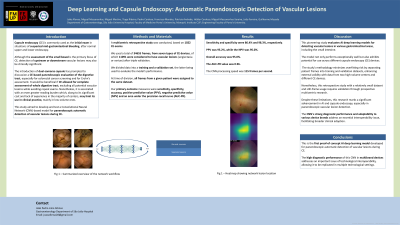Tuesday Poster Session
Category: GI Bleeding
P3453 - Deep Learning and Capsule Endoscopy: Automatic Panendoscopic Detection of Vascular Lesions
Tuesday, October 24, 2023
10:30 AM - 4:00 PM PT
Location: Exhibit Hall

Has Audio

Joao PL Afonso, MD
Centro Hospitalar de São João
Porto, Porto, Portugal
Presenting Author(s)
Award: Presidential Poster Award
João PL. Afonso, MD1, Miguel Mascarenhas, MD2, Miguel Martins, MD2, Tiago Ribeiro, MD2, Francisco Mendes, MD2, Pedro Cardoso, MD2, Ana Andrade, MD2, João Ferreira, PhD3, Hélder Cardoso, MD1, Guilherme Macedo, MD, PhD1
1Centro Hospitalar de São João, Porto, Porto, Portugal; 2Centro Hospitalar São João, Porto, Porto, Portugal; 3University of Porto-FEUP, Porto, Porto, Portugal
Introduction: Capsule endoscopy (CE) is commonly used as the initial exam in situations of suspected mid-gastrointestinal bleeding, after normal upper and lower endoscopy. Although the assessment of the small bowel is the primary focus of CE, detection of upstream or downstream of vascular lesions may also be clinically significant. This study aimed to develop and test a Convolutional Neural Network (CNN)-based model for panendoscopic automatic detection of vascular lesions during CE.
Methods: A multicentric retrospective study was conducted, based on 1022 CE exams. We used a total of 34655 frames, from seven types of CE devices, of which 11091 were considered to have vascular lesions (angiectasia or varices) after triple validation. We divided data into a training and a validation set, the latter being used to evaluate the model’s performance. At time of division, all frames from a given patient were assigned to the same dataset. Our primary outcome measures were sensitivity, specificity, accuracy, positive predictive value (PPV), negative predictive value (NPV) and an area under the precision-recall curve (AUC-PR).
Results: Sensitivity and specificity were 86.4% and 98.3%, respectively. PPV was 95.2%, while the NPV was 95.0%. Overall accuracy was 95.0%. The AUC-PR value was 0.96. The CNN processed 115 frames per second.
Discussion: This is the first proof-of concept AI deep learning model developed for panendoscopic automatic detection of vascular lesions during CE. The high diagnostic performance of this CNN in multibrand devices addresses an important issue of technological interoperability, allowing it to be replicated in multiple technological settings.
Disclosures:
João PL. Afonso, MD1, Miguel Mascarenhas, MD2, Miguel Martins, MD2, Tiago Ribeiro, MD2, Francisco Mendes, MD2, Pedro Cardoso, MD2, Ana Andrade, MD2, João Ferreira, PhD3, Hélder Cardoso, MD1, Guilherme Macedo, MD, PhD1. P3453 - Deep Learning and Capsule Endoscopy: Automatic Panendoscopic Detection of Vascular Lesions, ACG 2023 Annual Scientific Meeting Abstracts. Vancouver, BC, Canada: American College of Gastroenterology.
João PL. Afonso, MD1, Miguel Mascarenhas, MD2, Miguel Martins, MD2, Tiago Ribeiro, MD2, Francisco Mendes, MD2, Pedro Cardoso, MD2, Ana Andrade, MD2, João Ferreira, PhD3, Hélder Cardoso, MD1, Guilherme Macedo, MD, PhD1
1Centro Hospitalar de São João, Porto, Porto, Portugal; 2Centro Hospitalar São João, Porto, Porto, Portugal; 3University of Porto-FEUP, Porto, Porto, Portugal
Introduction: Capsule endoscopy (CE) is commonly used as the initial exam in situations of suspected mid-gastrointestinal bleeding, after normal upper and lower endoscopy. Although the assessment of the small bowel is the primary focus of CE, detection of upstream or downstream of vascular lesions may also be clinically significant. This study aimed to develop and test a Convolutional Neural Network (CNN)-based model for panendoscopic automatic detection of vascular lesions during CE.
Methods: A multicentric retrospective study was conducted, based on 1022 CE exams. We used a total of 34655 frames, from seven types of CE devices, of which 11091 were considered to have vascular lesions (angiectasia or varices) after triple validation. We divided data into a training and a validation set, the latter being used to evaluate the model’s performance. At time of division, all frames from a given patient were assigned to the same dataset. Our primary outcome measures were sensitivity, specificity, accuracy, positive predictive value (PPV), negative predictive value (NPV) and an area under the precision-recall curve (AUC-PR).
Results: Sensitivity and specificity were 86.4% and 98.3%, respectively. PPV was 95.2%, while the NPV was 95.0%. Overall accuracy was 95.0%. The AUC-PR value was 0.96. The CNN processed 115 frames per second.
Discussion: This is the first proof-of concept AI deep learning model developed for panendoscopic automatic detection of vascular lesions during CE. The high diagnostic performance of this CNN in multibrand devices addresses an important issue of technological interoperability, allowing it to be replicated in multiple technological settings.
Disclosures:
João Afonso indicated no relevant financial relationships.
Miguel Mascarenhas indicated no relevant financial relationships.
Miguel Martins indicated no relevant financial relationships.
Tiago Ribeiro indicated no relevant financial relationships.
Francisco Mendes indicated no relevant financial relationships.
Pedro Cardoso indicated no relevant financial relationships.
Ana Andrade indicated no relevant financial relationships.
João Ferreira indicated no relevant financial relationships.
Hélder Cardoso indicated no relevant financial relationships.
Guilherme Macedo indicated no relevant financial relationships.
João PL. Afonso, MD1, Miguel Mascarenhas, MD2, Miguel Martins, MD2, Tiago Ribeiro, MD2, Francisco Mendes, MD2, Pedro Cardoso, MD2, Ana Andrade, MD2, João Ferreira, PhD3, Hélder Cardoso, MD1, Guilherme Macedo, MD, PhD1. P3453 - Deep Learning and Capsule Endoscopy: Automatic Panendoscopic Detection of Vascular Lesions, ACG 2023 Annual Scientific Meeting Abstracts. Vancouver, BC, Canada: American College of Gastroenterology.

